

Albeit this, parents are also human beings who still may have conflicts with their children and want to better understand and control their behaviour. This forum is designed to introduce parents who are interested in learning more about how to communicate positively with their children.
Self-reflect. Top 10 Social Issues for Today's Teenagers. Teenagers are going to witness some violent media at one time or another.

And it's not just TV, music, and movies that depict violence. Many of today's violent video games portray gory scenes and disturbing acts of aggression. Over the past couple of decades, studies have linked watching violence to a lack of empathy and even aggressive behavior.23 And other studies have shown the number one factor in determining how kids relate to media is how their parents think and act.24. Real teens discuss "Issues with being a teen" 10 Most Common Problems Teens Face in 2021 - Parentology. Discuss! Common Problems Between Parents and Teenagers. Conflicts between parents and teens are nothing new.

Whether it's curfew, cell phones or even friends, conflicts can and will arise. How well teen and parent problems are handled, and the strategies used can make all the difference. Asserting Independence. A teenager's story about family conflict - ReachOut Parents. This story is part of a collection of stories from young people on ReachOut.com.

You can find other texts and videos about family conflict here: I was brought up in a really strict Catholic family. Causes of Conflict Between Parents and Teenagers - WeHaveKids - Family. Blake has worked in mental health since 2002.
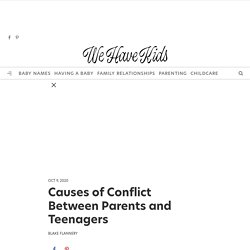
He educates others on their paths toward resilience and recovery. Why Do Parents and Teens Get Into Conflicts? Conflict happens when two people disagree based on their own goals, values, or beliefs. It's not always as simple as an argument. Thoughts... What Is Operant Conditioning and How Does It Work? Operant conditioning, sometimes referred to as instrumental conditioning, is a method of learning that employs rewards and punishments for behavior.
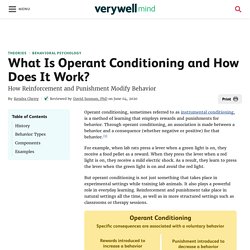
Through operant conditioning, an association is made between a behavior and a consequence (whether negative or positive) for that behavior.1 For example, when lab rats press a lever when a green light is on, they receive a food pellet as a reward. When they press the lever when a red light is on, they receive a mild electric shock. Positive Reinforcement and Operant Conditioning. In operant conditioning, positive reinforcement involves the addition of a reinforcing stimulus following a behavior that makes it more likely that the behavior will occur again in the future.
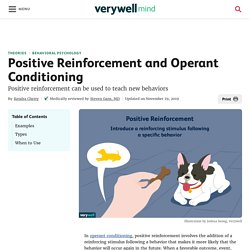
When a favorable outcome, event, or reward occurs after an action, that particular response or behavior will be strengthened. One of the easiest ways to remember positive reinforcement is to think of it as something being added. By thinking of it in these terms, you may find it easier to identify real-world examples of positive reinforcement. Sometimes positive reinforcement occurs quite naturally. For example, when you hold the door open for someone you might receive praise and a thank you. Positive Punishment and Operant Conditioning.
Positive punishment is a concept used in B.F.

Skinner's theory of operant conditioning. How exactly does the positive punishment process work? The goal of any type of punishment is to decrease the behavior that it follows. In the case of positive punishment, it involves presenting an unfavorable outcome or event following an undesirable behavior. When the subject performs an unwanted action, some type of negative outcome is purposefully applied. Differences Between Classical vs. Operant Conditioning. Classical and operant conditioning are two important concepts central to behavioral psychology.
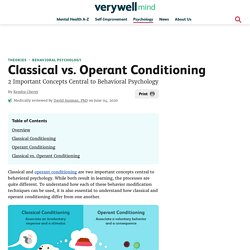
While both result in learning, the processes are quite different. To understand how each of these behavior modification techniques can be used, it is also essential to understand how classical and operant conditioning differ from one another. Overview Let's start by looking at some of the most basic differences. Classical ConditioningFirst described by Ivan Pavlov, a Russian physiologistFocuses on involuntary, automatic behaviorsInvolves placing a neutral signal before a reflex. Negative Reinforcement and Operant Conditioning.
Negative reinforcement is a term described by B.
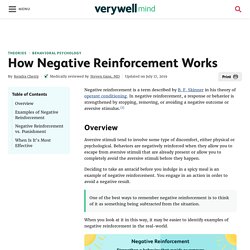
F. Skinner in his theory of operant conditioning. In negative reinforcement, a response or behavior is strengthened by stopping, removing, or avoiding a negative outcome or aversive stimulus.1 Overview Aversive stimuli tend to involve some type of discomfort, either physical or psychological. How Negative Punishment Works. Negative punishment is an important concept in B.
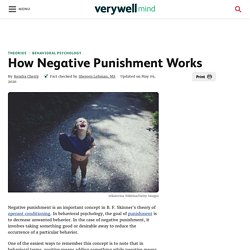
F. Skinner's theory of operant conditioning. In behavioral psychology, the goal of punishment is to decrease unwanted behavior. Negative Or Positive Reinforcement: Which Is Better? - Dictionary.com. Negative reinforcement vs. positive reinforcement Most people think that positive reinforcement means to lavish praise or encouragement, and that is a good part of its essence, but not all of it. What is negative reinforcement, then? Is that about withholding praise? Scolding? Admonishing? My thoughts... References.